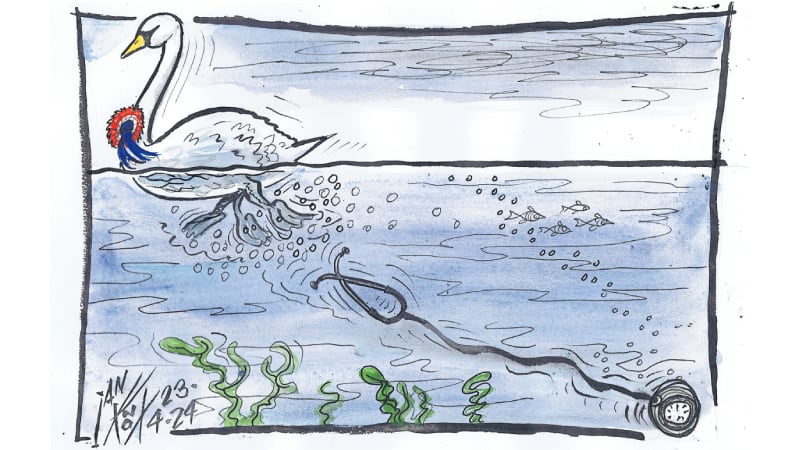Britain, as a constitutional monarchy, with an unwritten constitution and a first past the post (FPTP) electoral system, has the most unique governance ensemble among the leading liberal democracies. It relies heavily on tradition for legitimacy and has, until recently, avoided the adoption of plebiscites as a means of resolving controversial national issues. This is unsurprising. The stark, binary decision making process of the referendum is completely unsuited for use in conjunction with the equally crude FPTP system. It is much more suitable for use in countries with a proportional representation (PR) electoral system. PR reflects all shades of opinion much more accurately and consequently enables plebiscite results to be modified to represent this spectrum. Thus, only in Britain, with its winner takes all system, could a narrow vote in favour of departure from the EU have morphed into a hard Brexit.
Historically, due to FPTP, Britain has been governed by the alternating duopoly of the Conservative and Labour parties. Other smaller parties such as the Liberals could win 20 per cent of the popular vote but end up with just six seats in a parliament
of 650.
The above hegemony was eventually broken by the seismic shift of the UK tectonic plates to identity based politics – namely the emergence of two groups of separatists – the Tory Brexiteers in England and the SNP in Scotland. In the 2019 Westminster election the SNP won more than 80 per cent of the parliamentary seats in Scotland with just 45 per cent of the popular vote. The Tories won 65 per cent of the parliamentary seats in England with 45 per cent of the popular vote. These results clearly exaggerate the level of support for both parties.
Both have proposed very radical constitutional changes for their respective jurisdictions (UK & Scotland) which are based on implausible and dubious assumptions. Both demand greater ‘sovereignty’ for their differing jurisdictions. They do not explain to their respective electorates the inconvenient trade-off between ‘sovereignty’ and trade. More ‘sovereignty’ leads inexorably to less trade and lower levels of prosperity. We are now looking at the potentially catastrophic prospect of a hard border between England and EU-based Scotland. Neither the SNP nor the Tories have much incentive to mitigate the effects of this slow motion train crash under a skewed LPTP electoral system.
FPTP is an anachronism. It has left millions of people without a democratic voice.
As Britain adapts to meet the demands of its post-Brexit future it is imperative that, for ethical and pragmatic reasons, all UK citizens have a voice in the debate about the future. FPTP won’t deliver that. The UK needs an effective democracy that commands the unequivocal support of the people. This can only be built on an equitable electoral system based on PR.
A switch to PR should be made as we approach the centenary of the Equal Franchise Act of 1928 which introduced female suffrage. At almost 100 years after that significant milestone, the UK democracy is overdue a further injection of fairness.
GEORGE WORKMAN
Morningtown, Co Meath
Nationalists should take stock
It appears to be in the nature of nationalist writers and politicians to label Northern Ireland as a total disaster. This of course implies that the Republic of Ireland has been a huge success, or at least it would have been had it not been for partition. It also implies that nationalists have been successful in advancing their cause and blameless in any shortcomings in how Northern Ireland has delivered for its inhabitants.
In relation to the performance of the Republic. Firstly, considering the prevailing conditions at the time it was perhaps understandable that Irish nationalists were able to stoke emotions and gain support to leave the United Kingdom in 1921.
However, with the experience of 100 years of poor economic performance and the associated high emigration (particularly to England), and a high dependence on the UK and latterly on the EU, it is surely time to take stock. With a visit to the GP and A&E costing €50 and €100 and the cost of living generally higher in the Republic, the prosperity and wellbeing of individual Irish citizens appears to come a poor second to the nationalist cause.
The performance of political nationalism in Northern Ireland has also been less than impressive.
In Westminster Elections, since 1997, the overall Irish nationalist vote has actually shrunk while their Scottish counterparts have more than doubled their vote share. Irish nationalism`s campaign against northern Irish unionists has ensured they have failed to convince any unionist of the merits of a united Ireland.
But perhaps most notably, according to opinion polls, they have even failed to convince a significant number of their own voters of the merits of a united Ireland.
JAMES MARTIN
Dromore, Co Down
Thoughts turn to tragic death of father and son
FORTY years ago, on May 5 1981, Bobby Sands died.
That month I was taking my final medical exams at Queen’s University.
I was living in the Mater Hospital as my family had been burnt out of our house three months previously.
When I awoke on May 5 the buzz around the hospital was not about Bobby Sands having died; it was that Eric Guiney, a milkman, and his
14-year-old son Desmond were both dying in the Intensive Care Unit.
They had been out in their milk float at 6am delivering milk to the people of the Antrim Road when an angry crowd attacked them.
Mr Guiney lost control of the vehicle, which crashed into a lamp post. It was reported that ambulance and fire officers who arrived to help were attacked at the scene.
When I recall that day, my thoughts go primarily to the tragic deaths of this Northern Irish/Ulster/Irish father and son who were never associated with violence, nor hatred of any kind. They had no interest in any so-called ‘war’.
They were this country at its best.
DR PHILIP McGARRY OBE
FRCPsych, Belfast
DUP not loved
by British press
O
n the BBC in April last year, David Dimbleby remarked that the DUP were like salamanders “who have remained unchanged for millions of years”.
A month earlier, an article in the Sun newspaper said of the party, then still influential in Westminster, “our destiny is governed’’ by intransigent people ‘who care nothing for the wider interests of the UK”. That same month on Channel 4, Jon Snow said of them: “they’re one of the most extreme political entities in the British Isles’. These are not untypical media comments. The DUP is not loved by the British press and, unavoidably, that dislike influences attitudes towards the rest of us in Northern Ireland.
Being as it’s beyond satire, one blushes to think what British commentators are to make of the fact that Sir Jeffrey Donaldson, the potential ‘liberal’ challenger to ‘young earther’ Edwin Poots for the leadership of the largest unionist party, is on record as saying that his political idol is Enoch Powell, a man perceived by many to be an arch racist.
Dear help us.
WES HOLMES
Belfast BT15







